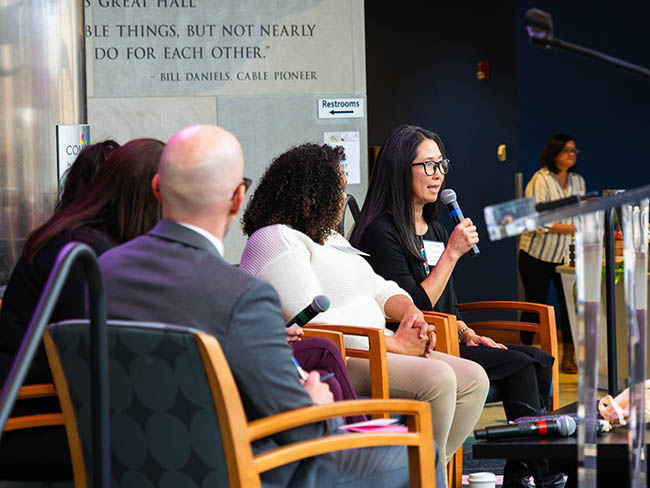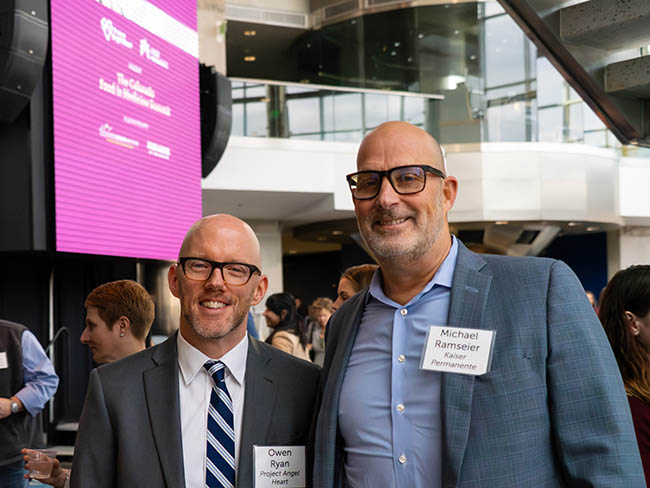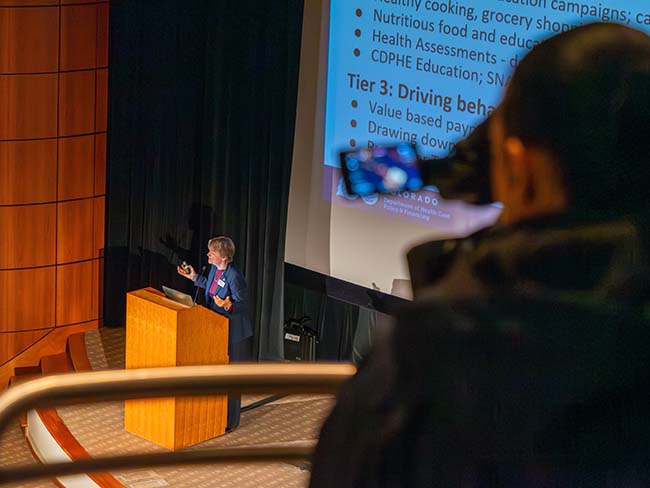Hundreds attend first Food Is Medicine Summit
Attendees look at ways to get healthy food to people who don’t have enough or who have a serious illness.
The Food Is Medicine Summit was attended by researchers, policymakers, health care professionals, and representatives from community organizations.
Hundreds of researchers, policymakers, and representatives from community organizations gathered for the first-ever Colorado Food Is Medicine Summit on November 8, 2023. Panelists discussed how getting healthy food to people not only fuels their bodies and minds, but can help manage ongoing conditions, decrease recovery time after hospitalization, and save patients and health systems money.
The result: healthier Coloradans and more affordable health care costs.
Kaiser Permanente and Project Angel Heart convened the summit in partnership with the Colorado Health Institute and Food Bank of the Rockies.
“By the end of the day, we will have a better understanding of the current state of ‘food is medicine’ in Colorado, and how our collective groups can work together to enhance our collective impact,” Mike Ramseier, regional president of Kaiser Permanente in Colorado, said in opening remarks. “Everyone deserves food that enhances their health.”
Owen Ryan, president and CEO of Project Angel Heart, said the summit showcased successful ‘food is medicine’ initiatives across Colorado and set the table for future collaboration.
“There is a big community in Colorado that is interested and invested in ‘food as medicine’, but that Colorado community is not as connected as it could be,” Ryan said. “I think today is a tipping point for Colorado. This is going to change how we deliver ‘food is medicine’ to people across the state.”
Food Is Medicine — what is it?
Food Is Medicine initiatives address more than just nutrition education. They are about the connection between health and food, equitable access to healthy foods, and food as a contributor to a person’s overall health.
These initiatives include a spectrum of programs for those who need the most support, such as people who:
- Have an acute or chronic illness or are at risk of developing illnesses
- Are recovering from a major medical event, such as a heart attack or surgery
- Are malnourished and can’t afford or lack access to the types and amount of food they need to be their healthiest
- Have a serious illness or disability that prevents them from shopping or cooking for themselves
How people access Food Is Medicine programs takes many different forms, ranging from drive-up food banks — where people can pick up a free box full of fruits, vegetables, meats, and other items to make nutritious meals — to the premade, medically tailored meals delivered to the homes of people with serious illnesses.
At Kaiser Permanente, patients answer screening questions to help determine whether they have access to healthy food. Community health specialists, doctors, nurses, and others then connect the members to community organizations that can help fulfill the patients’ needs.
The first Food Is Medicine Summit brought statewide stakeholders together to focus on how the different groups involved in these initiatives can improve their collective reach and impact.
- Lynnette Namba
- Crowd aerial view
- Owen and Mike
- speaker videographer
- crowd intently listening
As a part of the National Strategy on Hunger, Nutrition, and Health, Kaiser Permanente is supporting Food Is Medicine efforts in Colorado. Kaiser Permanente supported Project Angel Heart’s expansion into southern Colorado in 2022 with a $580,000 grant, and in early 2023 awarded a 3-year grant of $1.4 million to fund the program’s continued expansion into northern Colorado. In 2022, Kaiser Permanente also supported Food Bank of the Rockies’ Culturally Responsive Food Initiative with a $480,000 grant to work with smaller food banks to build their diversity, equity, inclusivity, and access practices.
Bending the health care cost curve
Food Is Medicine initiatives can also impact health care costs. Project Angel Heart’s research shows that medically tailored meals can improve people’s health and reduce health care costs. One study examined data from the Colorado All Payer Claims Database and found that among 708 clients with different chronic diseases who received 1 medically tailored meal a day for 6 months, hospital readmission rates declined 13%. And there was a 24% average reduction in total health care costs across several chronic conditions.
-
Social Share
- Share Hundreds Attend First Food Is Medicine Summit on Pinterest
- Share Hundreds Attend First Food Is Medicine Summit on Linkedin
- Share Hundreds Attend First Food Is Medicine Summit on Twitter
- Share Hundreds Attend First Food Is Medicine Summit on Facebook
- Print Hundreds Attend First Food Is Medicine Summit
- Email Hundreds Attend First Food Is Medicine Summit

April 23, 2024
We’re rising up to help prevent falls
Kaiser Permanente is committed to finding ways to help reduce falls in …

April 17, 2024
5 common health conditions men don’t like to talk about
Some of the most common conditions affecting men carry a social stigma …

April 9, 2024
Denver Fire Department annual blood work screenings triple
It’s easy to put off recommended health screenings, and sometimes even …

April 1, 2024
Lynch syndrome: Managing the risk of hereditary colon cancer
Lynch syndrome is a gene mutation that increases colon cancer risk. Learn …

March 26, 2024
Donations assure access to affordable health care
Kaiser Permanente grant and challenge spark $18.7 million for Denver Health’s …

March 14, 2024
Healthy kidneys support overall good health
Kaiser Permanente excels in preventing, detecting, and treating kidney …

February 27, 2024
Addressing hunger and nutrition to improve health
In alignment with the White House, Kaiser Permanente continues its work …
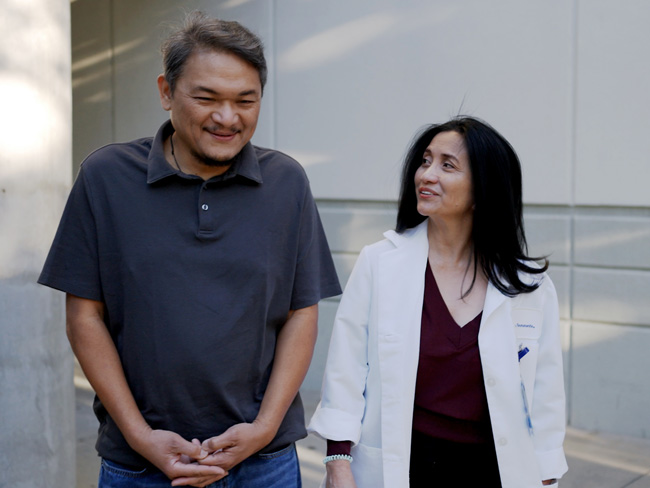
February 20, 2024
Good health requires more than health care
Everyone needs a safe place to live, healthy food to eat, and other essentials …

February 8, 2024
Road to heart health: Living well
You have only one heart. ‘Prescribe’ yourself a few changes to help protect …

February 1, 2024
Road to heart health: Know your risk factors
One of the best ways to prevent future heart conditions is knowing what …

January 31, 2024
Prioritizing policies for health and well-being in Colorado
CityHealth’s 2023 Annual Policy Assessment awards cities for their policies …
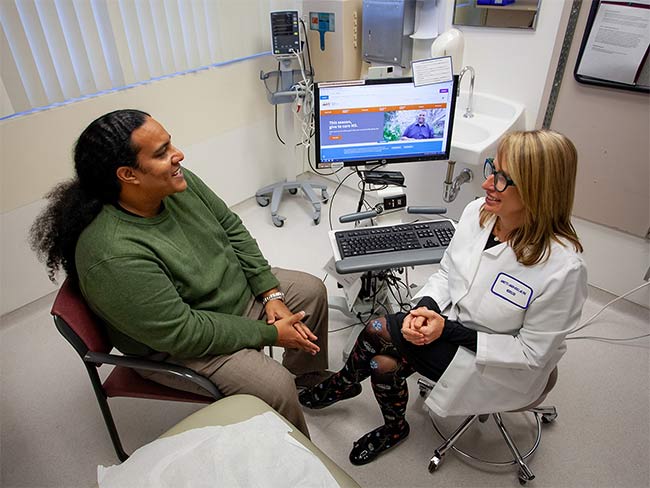
December 20, 2023
Research transforms care for people with multiple sclerosis
Our researchers are leading the way to more effective, affordable, and …

December 20, 2023
Funding solutions to end gun violence
Researchers and organizations are exploring inventive ways to reduce gun …

December 6, 2023
Leading research with gratitude
Learn how you can participate in a study to uncover what causes cancer …

October 19, 2023
Expanding support for housing stability
Innovative medical-legal partnerships keep families in stable housing to …

October 11, 2023
Expanded gun violence prevention efforts
The next phase for the Kaiser Permanente Center for Gun Violence Research …
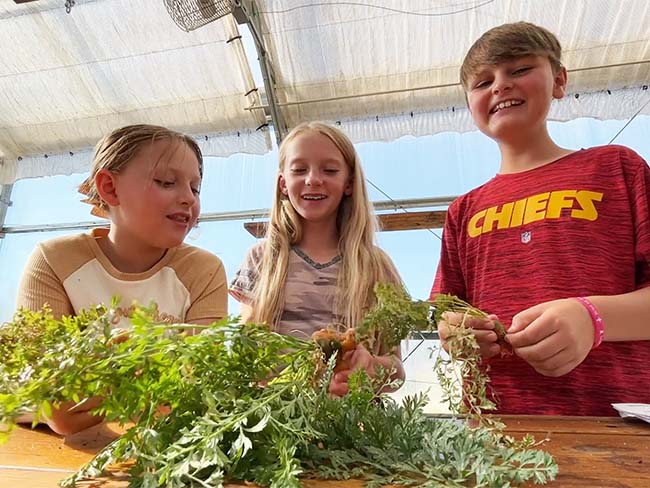
September 27, 2023
10 school districts receive next round of RISE grants
The Thriving Schools program helps educators and students in Colorado integrat …

September 21, 2023
Researching climate and health solutions
Kaiser Permanente is partnering with the National Academy of Medicine.

September 13, 2023
Transforming the medical record
Kaiser Permanente’s adoption of disruptive technology in the 1970s sparked …

August 28, 2023
Grants improve the total health of our communities
Kaiser Permanente increases access to mental health services in Southern …

August 16, 2023
Cervical cancer screening: Exploring the at-home HPV test
Kaiser Permanente is at the forefront of cervical cancer research. Find …
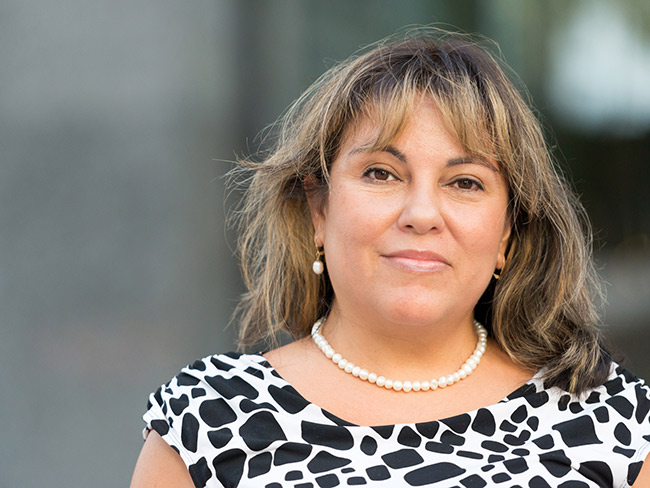
August 15, 2023
Screening for breast cancer: Mammogram guidelines
Mammograms can help detect breast cancer early, when it’s easier to treat. …

August 14, 2023
Tips for ensuring a safe and healthy college experience
Students should study up on their care options to ace their school experience. …

August 14, 2023
Marla’s story: Surviving acute promyelocytic leukemia
After a diagnosis for a rare type of blood cancer, Marla Marriott got high-qua …

August 10, 2023
Highlighting our community health work in Southern California
The Kaiser Permanente Southern California 2022 Community Health Snapshot …

August 4, 2023
Eating well and adopting healthy habits helps prevent cancer
Learn how lifestyle medicine is part of cancer care at Kaiser Permanente.

August 2, 2023
Social health resources are just a click or call away
The Kaiser Permanente Community Support Hub can help members find community …

August 1, 2023
Joining forces to improve community health
The Kaiser Permanente and 211 LA partnership makes strides in improving …

June 15, 2023
Stay safe while having fun in the sun
Tips for preventing sunburn and decreasing the risk of skin cancer.

June 14, 2023
Honored for commitment to people with disabilities
The Achievable Foundation recognized Kaiser Permanente for its work to …
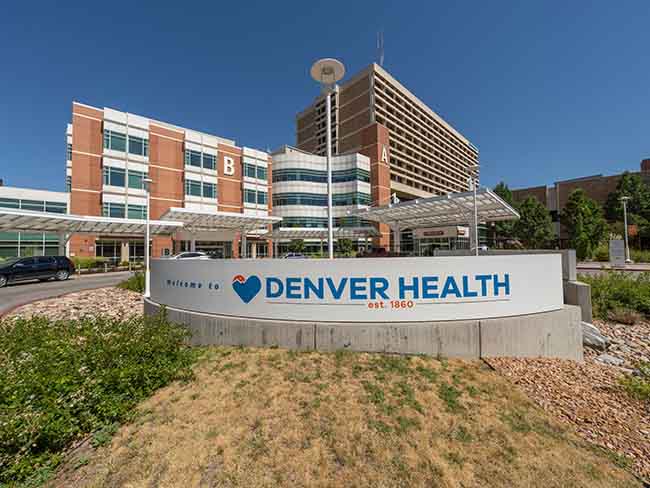
May 30, 2023
Kaiser Permanente commits up to $10 million to Denver Health
Funding comes as Denver Health provided $120 million in uncompensated care …
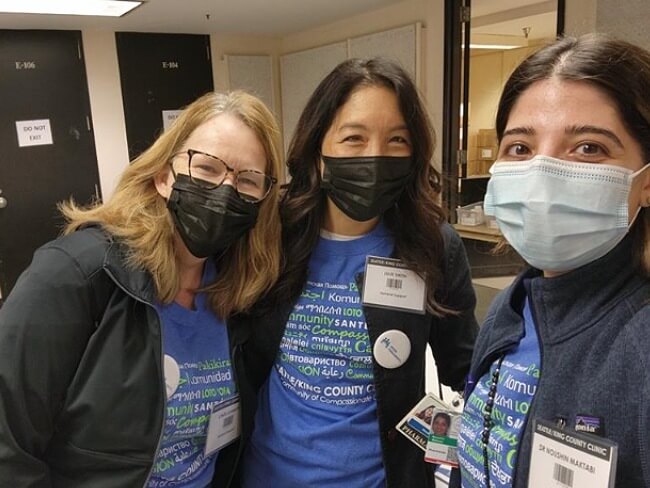
May 30, 2023
Volunteer-driven clinic offers free care in Washington
The annual Seattle King County Clinic brings health care to low-income …

May 22, 2023
Investing and partnering to build healthier communities
Kaiser Permanente supports Asian Americans Advancing Justice to promote …
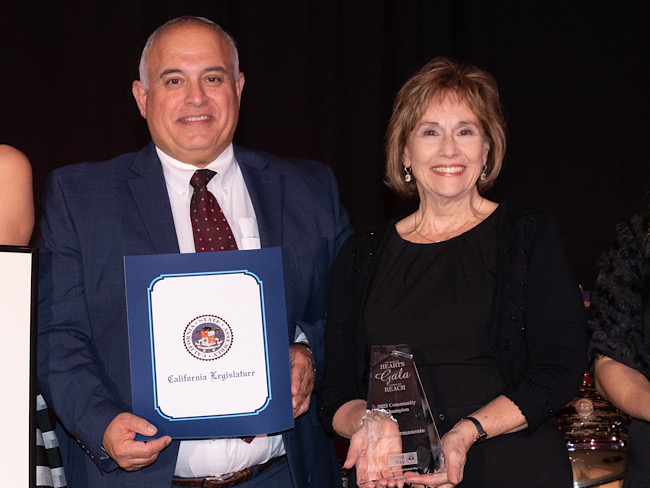
May 19, 2023
Partnering to improve the health of homeless individuals
Grant funds will combat housing inaccessibility and improve health care …

May 16, 2023
How we help people access financial literacy skills
Kaiser Permanente is working with community partners to reduce financial …

May 3, 2023
Transforming the lives of people experiencing homelessness
Kaiser Permanente recognizes that safe, affordable housing is crucial to …

April 25, 2023
Hannah Peters, MD, provides essential care to ‘Rosies’
When thousands of women industrial workers, often called “Rosies,” joined …

April 14, 2023
The importance of screening for gestational diabetes
Gestational diabetes poses a significant risk to women of color, particularly …
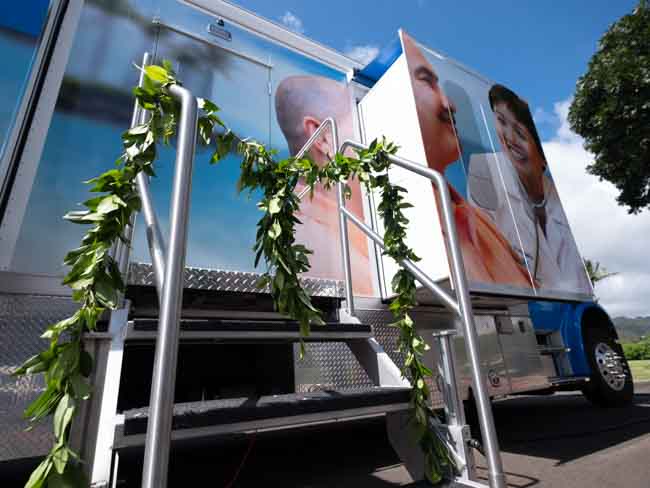
April 7, 2023
Increasing access to health care
Kaiser Permanente launches new mobile health vehicle on Oahu.

April 3, 2023
Hospital patients who are homeless connected to housing
A Kaiser Permanente program connects patients experiencing homelessness …

March 28, 2023
Sentenced to prison, not a life of bad health
Reentering society after serving time can land people in unhealthy situations. …

March 14, 2023
Colorectal cancer on the rise among younger adults
Learn why early screening is crucial for prevention and treatment.
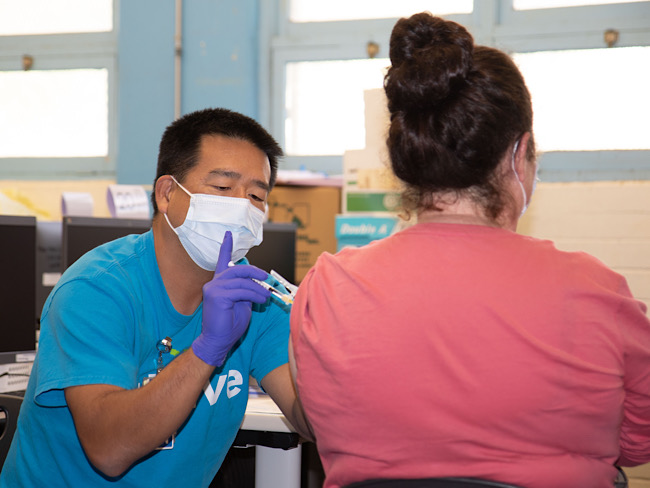
March 6, 2023
Have shots, will travel
Hawaii community vaccination team’s pop-up events with COVID-19 and flu shots.
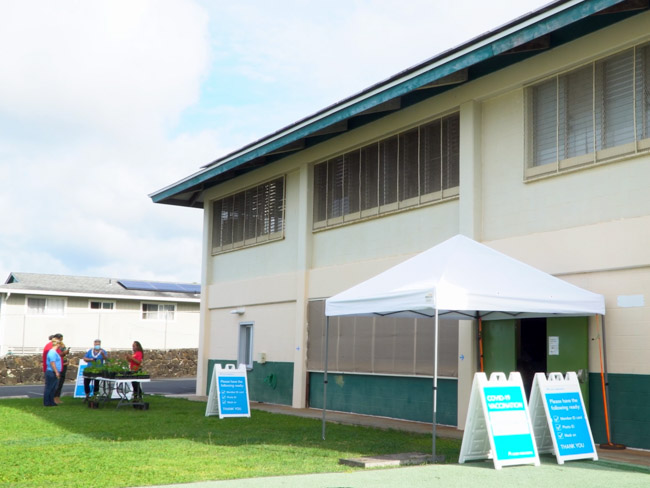
March 2, 2023
Improving the health of the community
Kaiser Permanente awards $80,000 in grants for health policy and community …

March 1, 2023
Spring forward: How to prepare for losing an hour of sleep
A sleep expert shares 4 practical tips for coping with the time shift and …
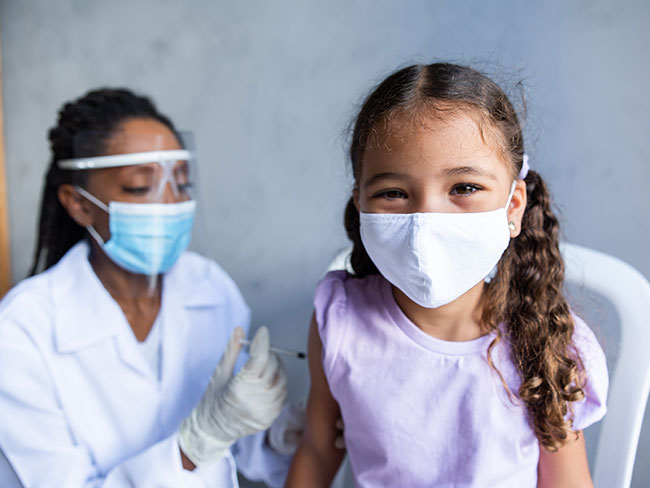
February 27, 2023
Teaching flu a lesson
School-based flu vaccination clinics made it safe and convenient for students …

February 23, 2023
Grants help spur economic opportunity
Kaiser Permanente funds programs to improve the overall health of the communit …
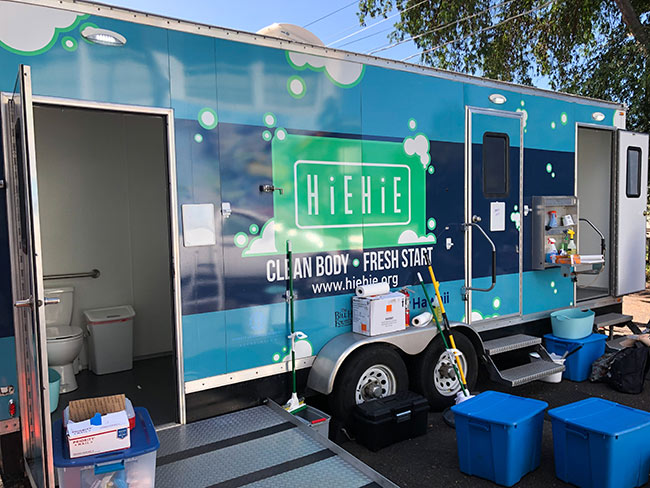
February 3, 2023
Addressing health and housing insecurity
Kaiser Permanente supports 3 Hawaii-based nonprofits.

February 2, 2023
Addressing social isolation in the Northwest
Kaiser Permanente invests $3.3 million to build healthy social connections …

January 27, 2023
Timely flu vaccinations at community events
Proactive flu prevention outreach in Downey, California.
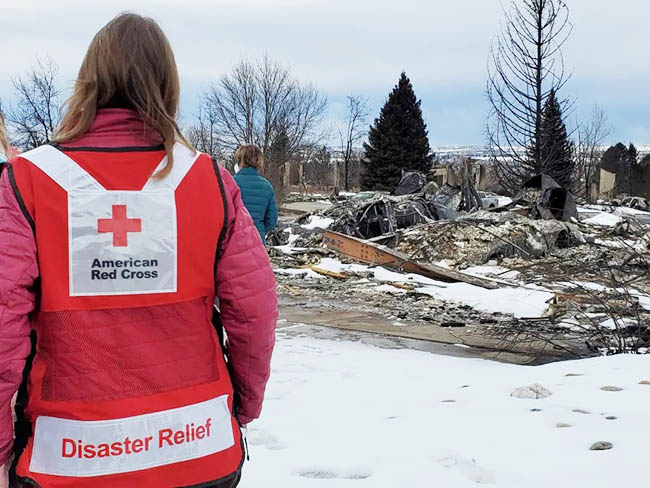
January 17, 2023
Increasing community resilience with disaster readiness
Kaiser Permanente partners with the American Red Cross to help address …

December 22, 2022
Denver earns an overall gold medal
CityHealth recognizes Denver for its leadership in supporting policies …

December 15, 2022
Helping provide teens a brighter future
Kaiser Permanente grants $150,000 to three community nonprofits.
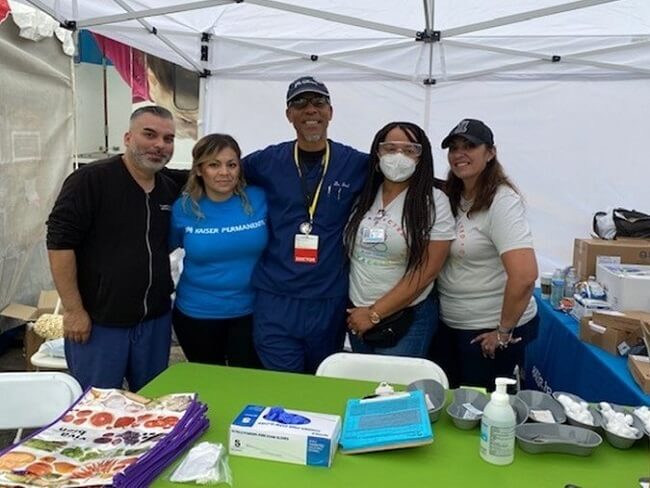
December 6, 2022
Building stronger, healthier communities at community event
Volunteers offered preventive care, first aid, cooling stations, and complimen …

December 2, 2022
Addressing homelessness and changing lives
Kaiser Permanente funds innovative projects on Oahu.

November 17, 2022
Addressing housing insecurity
Kaiser Permanente funds 2 grants for Hawaii-based nonprofits.

November 16, 2022
Passport to preventive care
Special event helps Latino community ensure their flu vaccinations and …
November 11, 2022
Our integrated care model
We’re different than other health plans, and that’s how we think health …
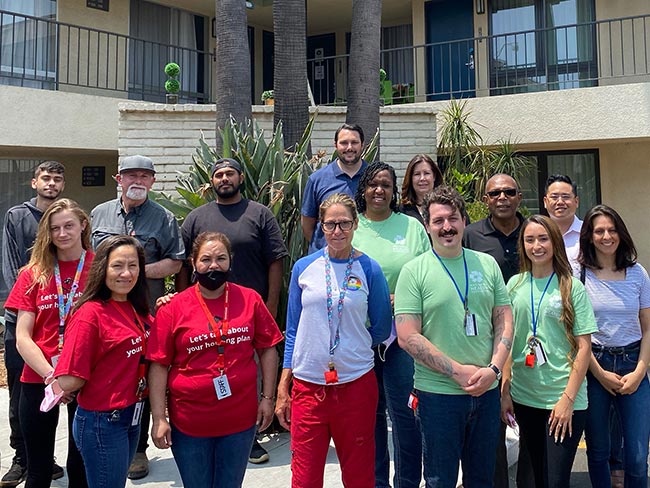
November 8, 2022
A shared goal: Ending homelessness in California
Where you live impacts your health. With a new $1.5 million grant, we’re …

October 3, 2022
Flu shots save lives and offer proven protection
Black people, Latinos, and people over 65 years of age are especially vulnerab …
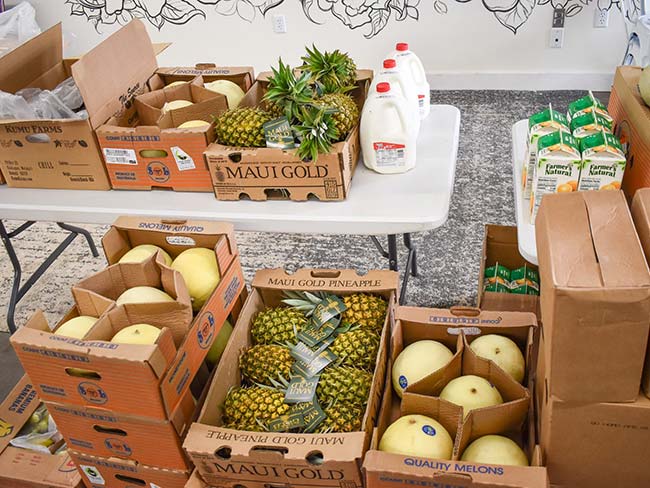
August 24, 2022
Grant to Aloha Harvest supports food security
Grant of $50,000 will provide 1,000 healthy meals to individuals with low …

August 19, 2022
Improving financial literacy
Kaiser Permanente announces $50,000 grant to Goodwill Hawaii.

August 18, 2022
Homeless and sick: Medical respite centers offer vital care
Working with our communities, we’re supporting centers that offer short-term …

August 17, 2022
2021 annual report sheds light on another challenging year
We reflect on 3 major COVID-19 surges, urgent vaccination efforts, and …

August 16, 2022
Seconds count: Know the signs of a stroke
A Kaiser Permanente physician shares why quick detection and expert treatment …

July 29, 2022
Helping community members access nutritious meals
Los Angelenos in need enjoy access to quality food, thanks to partnerships …

July 19, 2022
Connecting people to financial coaching
Debt, bad credit, and other money matters can affect a person’s physical …

June 23, 2022
Improving school health
A $60,000 grant will support the assessment of social-emotional health, …

June 10, 2022
Food and nutrition security
Supporting access to nutritious food for healthy communities

June 7, 2022
The secret to a long life: Keep up with health screenings
For men who often resist regular doctor visits and health screenings, making …

June 6, 2022
New approach reduces colon cancer deaths
Kaiser Permanente reduces colon cancer deaths in its Southern California …

June 6, 2022
Get the better of your anger
Stress can easily become anger. But you can practice self-care to head …

May 27, 2022
Grants help AAPI communities and businesses
Kaiser Permanente is working with community organizations and businesses …

May 13, 2022
Bolstering support for food security in ongoing pandemic
California produces nearly half of the nation's fruits and vegetables, …

May 5, 2022
Research study will inform the future of cancer prevention
Connect for Cancer Prevention Study’s goal to recruit 200,000 participants …
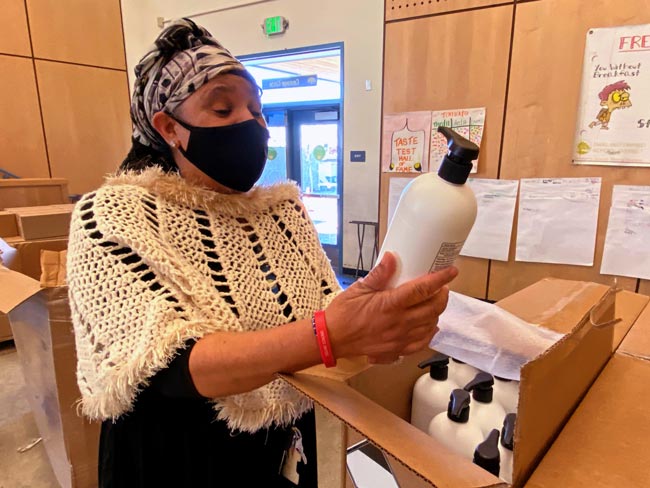
May 4, 2022
Donated supplies keep community organizations pandemic-ready
We donated over $28 million worth of face masks, hand sanitizer, and other …

April 15, 2022
Feeding Southern California families in need
Our Food for Life initiative has helped reduce food waste and in 2021 made …

April 1, 2022
Grant to help keep older adults housed and healthy
Kaiser Permanente provides funding to help local agencies increase access …

March 2, 2022
Scholarships support students pursuing health care careers
With our Health Equity Scholars Program, we’re helping students achieve …
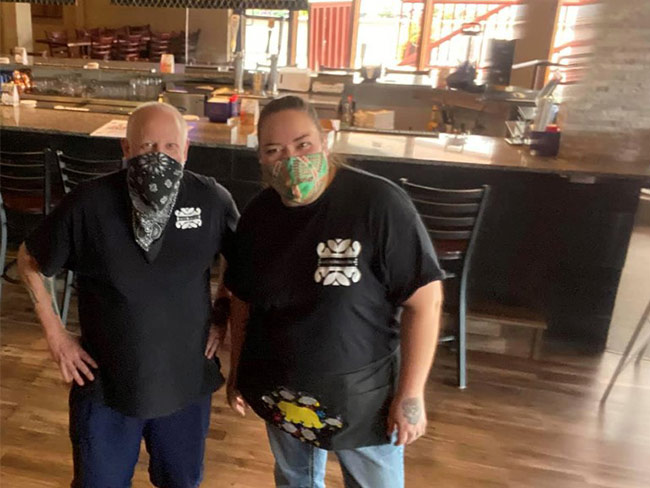
January 25, 2022
Helping small businesses thrive during the COVID-19 pandemic
Kaiser Permanente grants are supporting businesses such as the Carefree …
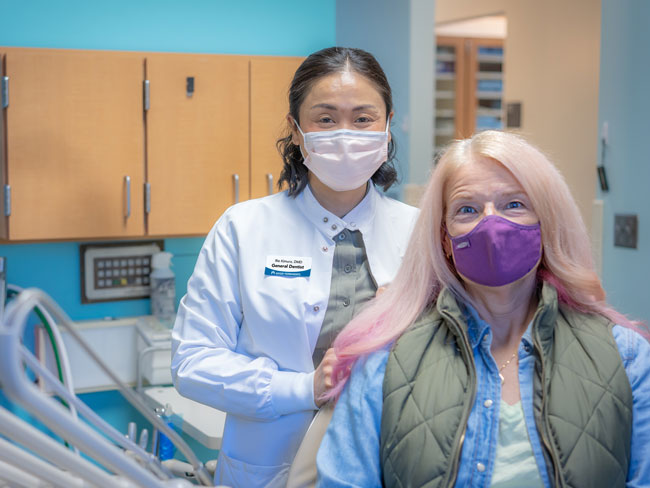
November 12, 2021
Dental visit speeds cancer diagnosis and treatment
A reminder to complete a routine mammogram — and early detection — helped …

September 9, 2021
How to lower your risk of dementia
It’s never too late (or too soon) to take preventive steps. And, with a …

August 19, 2021
Supporting small businesses owned by people of color
Kaiser Permanente’s partnership with Local Initiatives Support Corporation, …

August 18, 2021
$300K donation to house homeless veterans
Funding is part of a $3 million partnership with Community Solutions for …

July 30, 2021
Pairing doctors with your devices for improved health
Wellness and fitness-tracking devices can help doctors and patients coordinate …

July 13, 2021
Taking a stand against anti-Asian hate
Kaiser Permanente and Advancing Justice — AAJC support Asian Americans, …

July 2, 2021
Fireworks can cause wildfires, serious injury, and death
This Fourth of July, celebrate safely with family and friends.

June 8, 2021
Advancing equity in Colorado’s higher education system
Kaiser Permanente announces $1 million to create 15-year endowed fund for …

May 24, 2021
Supporting access to telehealth for vulnerable populations
Kaiser Permanente grants help fund community organizations working to expand …
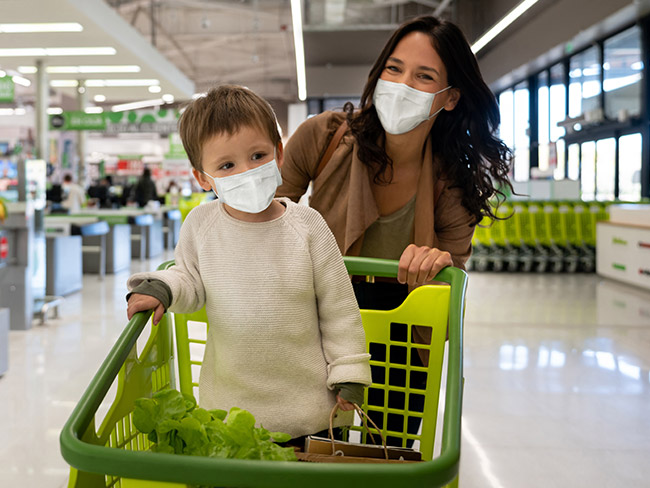
May 6, 2021
Outreach campaign helps 70,000 people apply for SNAP
Efforts to expand Food for Life SNAP enrollment program were accelerated …
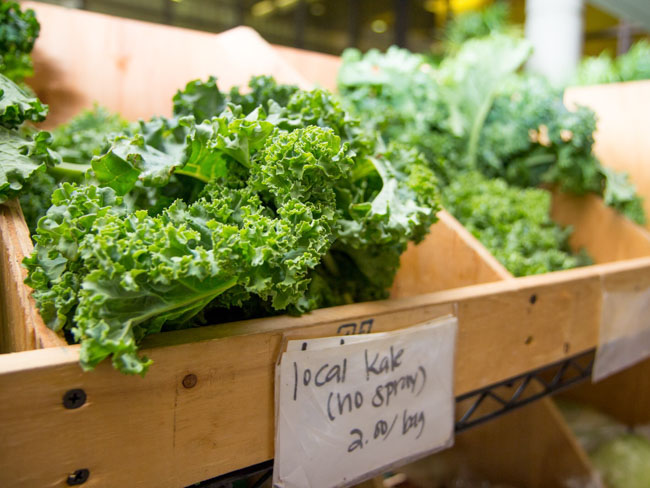
April 26, 2021
$90K granted to Food Basket to address food insecurity
Funding from Kaiser Permanente will allow underserved families across Hawaii …

February 22, 2021
The Permanente Richmond Field Hospital
Forlorn and all but forgotten, it played a proud role during the World …
October 13, 2020
Kaiser Permanente creates COVID-19 Social Health Playbook
Health care system provides model for screening patients for access to …

August 12, 2020
Grants support community health in midst of COVID-19
Kaiser Permanente pledges more than $28 million in grants, many to address …
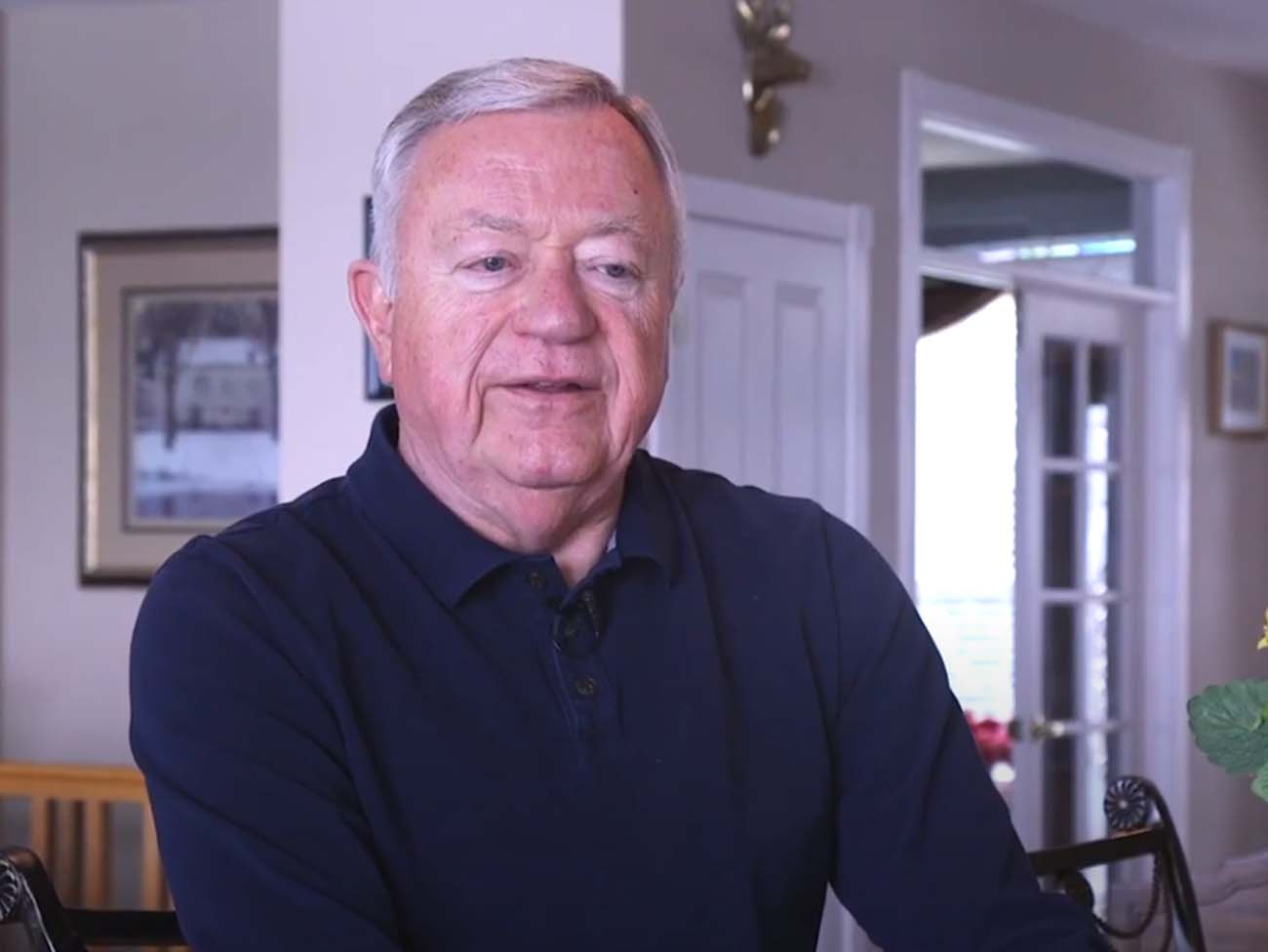
July 21, 2020
Diagnostic and preventive care is in our DNA
A routine screening helped detect Bill Walsh’s cancer before it became …

April 17, 2020
Food assistance outreach to ease COVID-19 financial strain
Kaiser Permanente’s Food for Life program will send text messages to almost …

February 5, 2019
Mobile clinics: 'Health on wheels'
Kaiser Permanente mobile health vehicles brought care to people, closing …
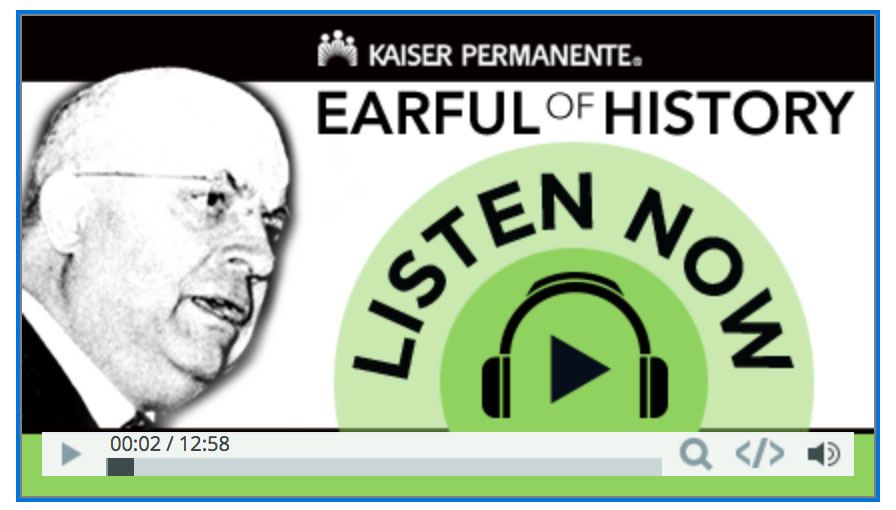
August 15, 2017
Sidney R. Garfield, MD, on medical care as a right
Hear Kaiser Permanente’s physician co-founder talk about what he learned …
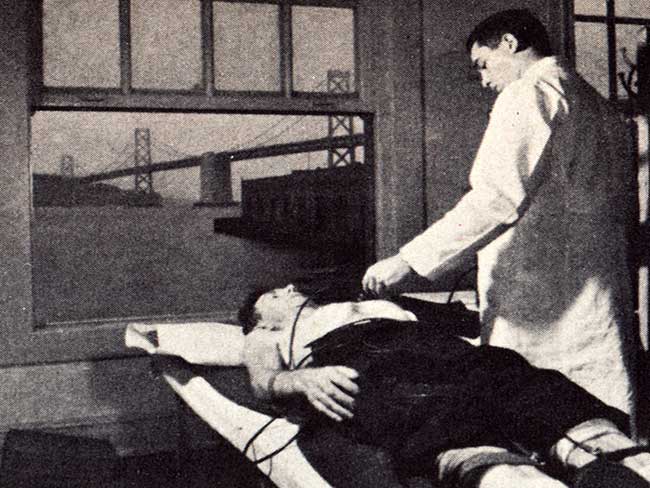
March 1, 2017
Screening for better health: Medical care as a right
When industrial workers joined the health plan, an integrated battery of …
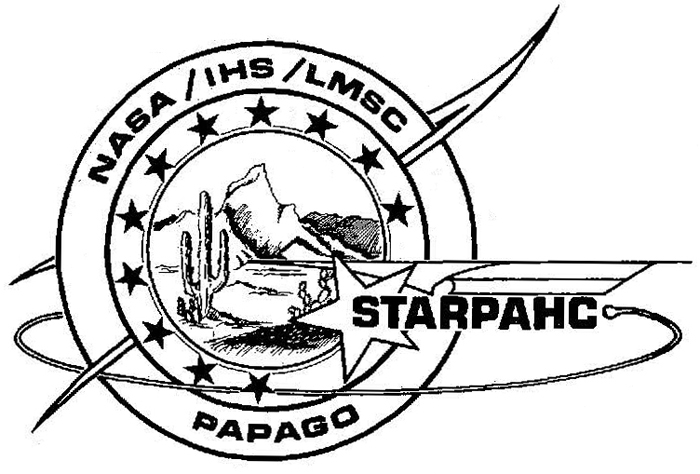
September 23, 2015
Kaiser Permanente and NASA — taking telemedicine out of this world
Kaiser Permanente International designs, develop, and test a remote health …
